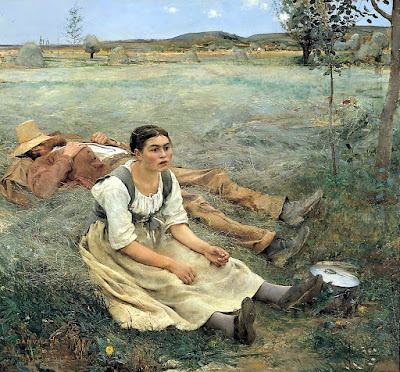Money can’t buy happiness but the lack of it seems to annoy just about everyone.
| Waiting, by Carol L. Douglas. I no longer remember what bureaucratic inefficiency prompted this so many years ago, but I can still feel the frustration. |
Last week, a line squall took down a branch from the maple in our front yard. Going out to inspect the damage, I saw that woodpeckers had hammered neat holes into much of it. The tree is mortally ill and there is no solution other than to have it taken down. It’s not a job I want to tackle because it overhangs power lines, Route 1, and my roof.
It’s going to cost about $1250, but that comes on the heels of $2000 in car repairs and $1400 for a washer and dryer this month (replacing a pair that died at the ripe old age of four years). I was having a small fit about cash flow when I got a text message from my pal Helen. I’ve written about her before: she’s a poor woman from North Braddock, PA who works part-time as a residential advisor for mentally ill adults. She has sarcoidosis along with an insatiable yearning for learning.
Helen was cheesed off. “I lost my nail clipper,” she fumed, “and I don’t have $1 to go to the Dollar Store to buy a replacement one right now.”
 |
|
The Gleaners, 1857, by Jean-François Millet, was never meant to be romantic. It was initially viewed with deep suspicion for its sympathetic portrayal of the poor.
|
For some reason, that totally cracked me up. Here we are in vastly different places in the American economy, suffering from the same darn problem: lack of ready capital. It makes me wonder whether anyone, ever, has enough money.
There are 442 billionaires in the United States. If a billionaire spends $100,000 a day and never makes another dime, he will run out of cash in 25 years. That seems very secure to me, but I really don’t know how billionaires live, any more than I truly understand how Helen lives or she me.
I imagine that when someone is that focused on acquiring wealth it’s either aggression or a mental aberration related to hoarding. Perhaps being down to their last million could make them feel as nervous as I do when I’m down to my last centime.
| Ruth, by Carol L. Douglas, was painted to demonstrate indirect painting, but it’s also a portrait of someone short of ready cash. It’s another very old painting from the mists of time. |
Helen was homeless last year at Christmas. It was a terrible concatenation of circumstances that ended up with her, her daughter and her granddaughter losing all their personal possessions and being stashed by Social Services in a motel. She had nothing, not even her winter boots.
Being involved with the social welfare network means you get advice from social workers, whether you want or need it. One of them told Helen, completely seriously, that she needed help with her ‘hoarding problem.’ Apparently, standards for hoarding are very low when all your possessions will fit in the trunk of a Ford Fiesta.
 |
|
Les Foins (Haymaking), 1877, by Jules Bastien-Lepage, who keenly felt the plight of the French peasant.
|
All of this is just a reminder of the wisdom of M. Micawber’s famous recipe for happiness, from David Copperfield:
“Annual income twenty pounds, annual expenditure nineteen six, result happiness. Annual income twenty pounds, annual expenditure twenty pound ought and six, result misery.”
We live in a credit-driven economy that would be quite unrecognizable to our ancestors. Everyone does it—families, businesses, government. I try not to play, but I also know there’s only so much worrying one can do about money. After all, we’re bound to make more tomorrow.




